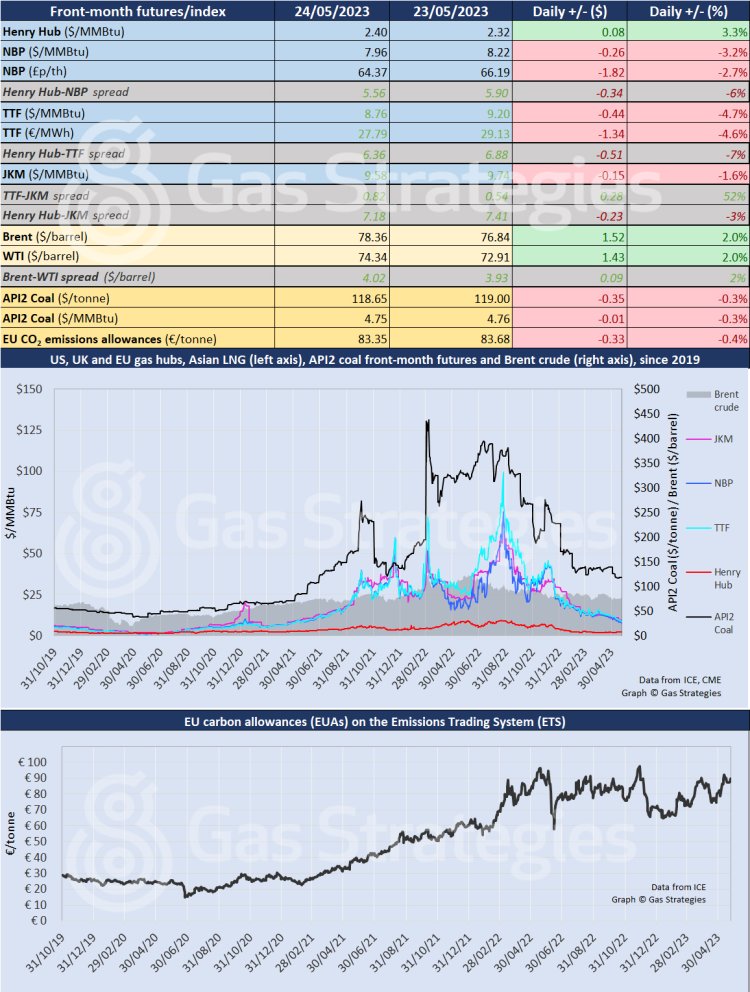
European spot natural gas fell again on Wednesday on signals of a weak regional economy hitting demand prospects.
TTF dipped by 4.7% to USD 8.76/MMBtu, while NBP saw a lower 3.2% decline to USD 7.96/MMBtu. Wednesday’s bearishness has put European benchmark prices at their lowest in exactly two years.
This comes as the European Commission proposed to halt all energy market support by the end of 2023 to support the bloc's fiscal policy, as it emerges from the energy crisis.
More relief is expected to be seen in NBP in the net few days, as a Thursday announcement from energy regulator Ofgem revealed that it will be slashing the energy price cap in July until end of September.
The regulator explained: “Today’s update means that, for the first time since the global gas crisis took hold more than 18 months ago, prices are falling for customers on default tariffs. The savings can now be passed on to customers more quickly, thanks to Ofgem now updating the price cap quarterly rather than every six months.”
JKM has also seen a decline although only a slight one compared to European spot values, with the Asian LNG market down 1.6% to USD 9.58/MMBtu, driven by the absence of a demand pick-up any time soon.
The International Monetary Fund (IMF) said on Wednesday in a report that stabilising LNG prices in the long-term entails building more terminals to achieve market integration, though it warned the cost of expanding the infrastructure poses a “major hurdle”.
“Companies need 15- to 20-year contracts to obtain bank financing for construction. Terminals usually cost USD 10-15 billion and take two to four years to complete. Timelines are less certain for projects without long-term sales contracts, and some may never be built”, it explained.
Henry Hub saw a 3.3% recovery after three-consecutive days of declines. The front-month contract settled at USD 2.4/MMBtu. This happened despite weak weather-driven demand, steady production and expectations for a triple-digit storage increase.
According to the estimates, the US Energy Information Administration (EIA) is expected to report a storage injection of 119 Bcf for the week ending 19 May.
Both WTI and Brent gained 2% after an unexpectedly large fall in US inventory draw and a warning from Saudi Arabia to further cut OPEC+ production, Reuter reported.
Saudi energy minister said short-sellers betting oil prices will fall should "watch out" for pain – comments which some investor took as a signal that the organisation and allies including Russia, could consider further output cuts at a meeting on 4 June.
As a result, WTI settled at USD 74.34/barrel and Brent at USD 78.36/barrel.
Front-month futures and indexes at last close with day-on-day changes (click to enlarge):  Time references based on London GMT. Brent, WTI, NBP, TTF and EU CO2 data from ICE. Henry Hub, JKM and API2 data from CME. Prices in USD/MMBtu based on exchange rates at last market close. All monetary values rounded to nearest whole cent/penny. Text and graphic copyright © Gas Strategies, all rights.
Time references based on London GMT. Brent, WTI, NBP, TTF and EU CO2 data from ICE. Henry Hub, JKM and API2 data from CME. Prices in USD/MMBtu based on exchange rates at last market close. All monetary values rounded to nearest whole cent/penny. Text and graphic copyright © Gas Strategies, all rights.









